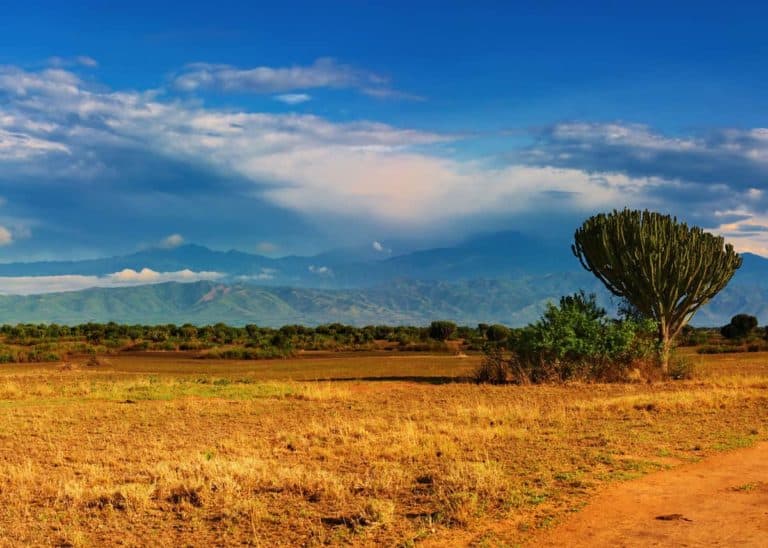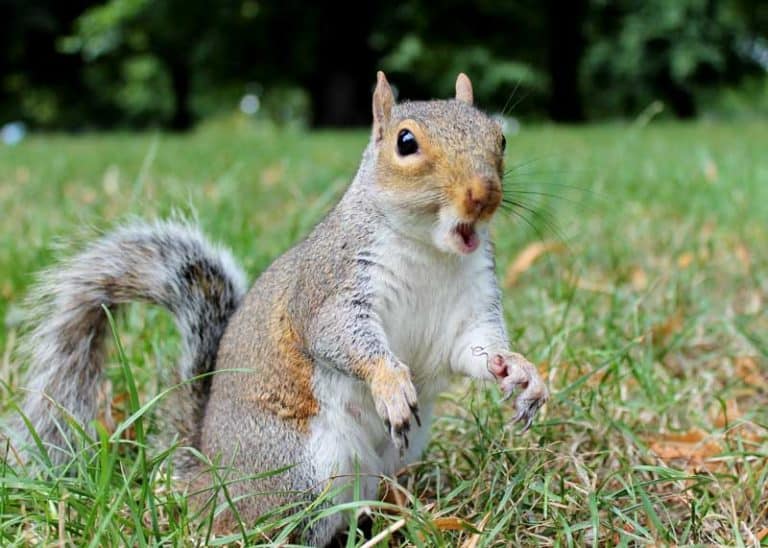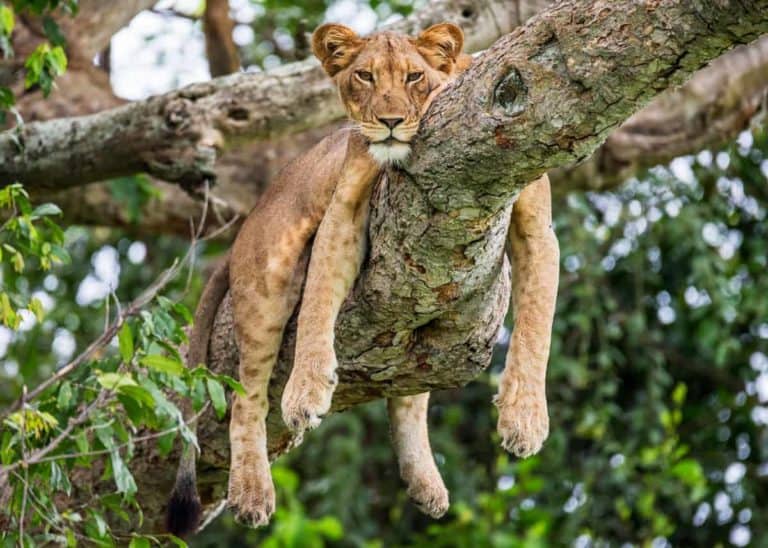Why Do Hyenas Laugh? 12 Laughing Hyena Sounds (What They Mean)
The maniacal laughing of hyenas is one of Africa’s most recognizable sounds. Why do hyenas laugh? Are they actually laughing? What does a hyena laugh mean? Do all species of hyenas laugh? In this post, we’ll answer these questions and more.
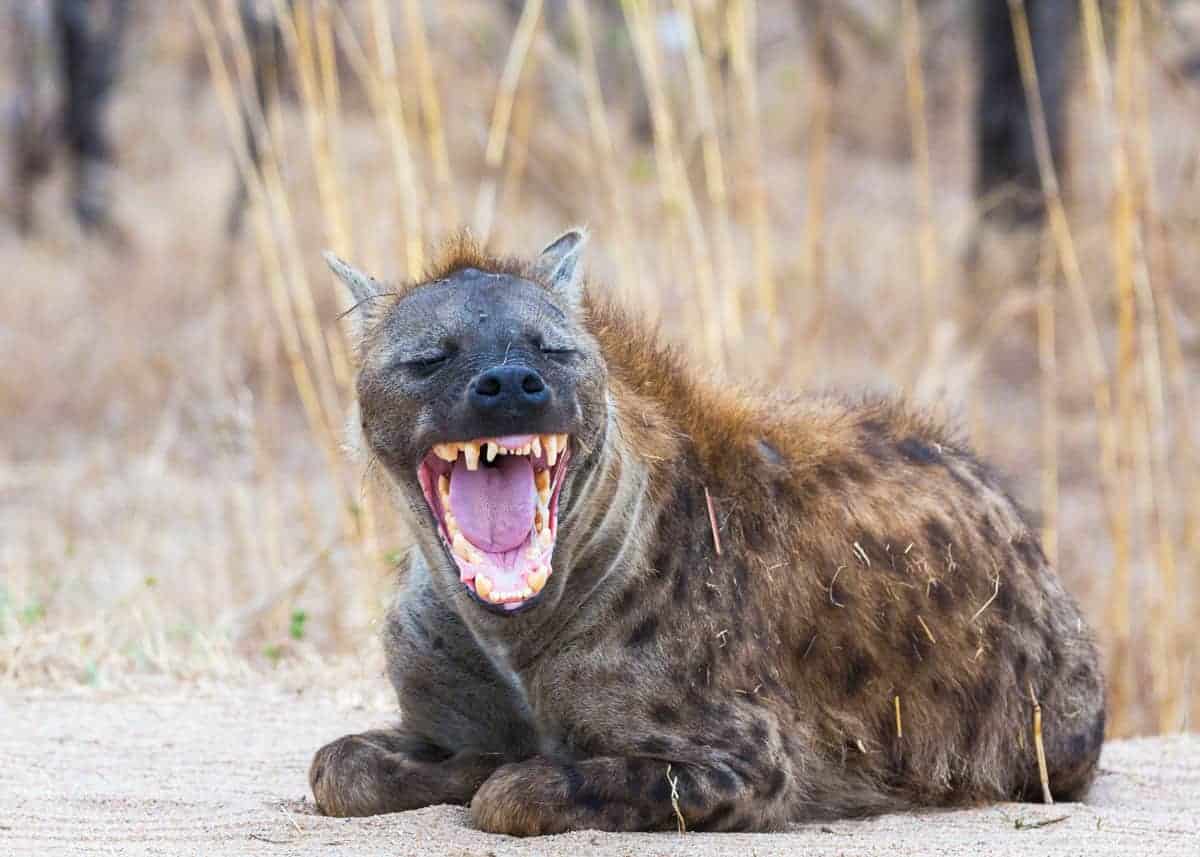
Guide to the Hyena Laugh
I’m sure that you’ve heard the laugh of a hyena. To get started, let’s establish a little about these laughing hyenas.
But first, let’s listen to some of their vocalizations.
Do All Hyena Species Laugh?
No. There are four hyena species, and only one (spotted hyena) is known for laughing.
Here are the four hyena species – and their calls.
- Aardwolf: It’s known as an ant hyena or civet hyena and eats only insects. Its appearance is that of a skinny, striped hyena. The aardwolf makes clucking, barking, and roaring sounds – but no laughing.
- Striped Hyena: This is the smallest of the true hyenas. And its vocal communication is very limited – consisting mainly of soft growls and grunts. The striped hyena doesn’t laugh.
- Brown Hyena: This is the rarest species of hyena and is known for seldom vocalizing. They make small grunts, growls, and squeaks that can only be heard a short distance. Brown hyenas don’t laugh.
- Spotted Hyena: This is the largest hyena and the noisiest. The spotted hyena is known as the laughing hyena.
This post will focus exclusively on the spotted (laughing) hyena.
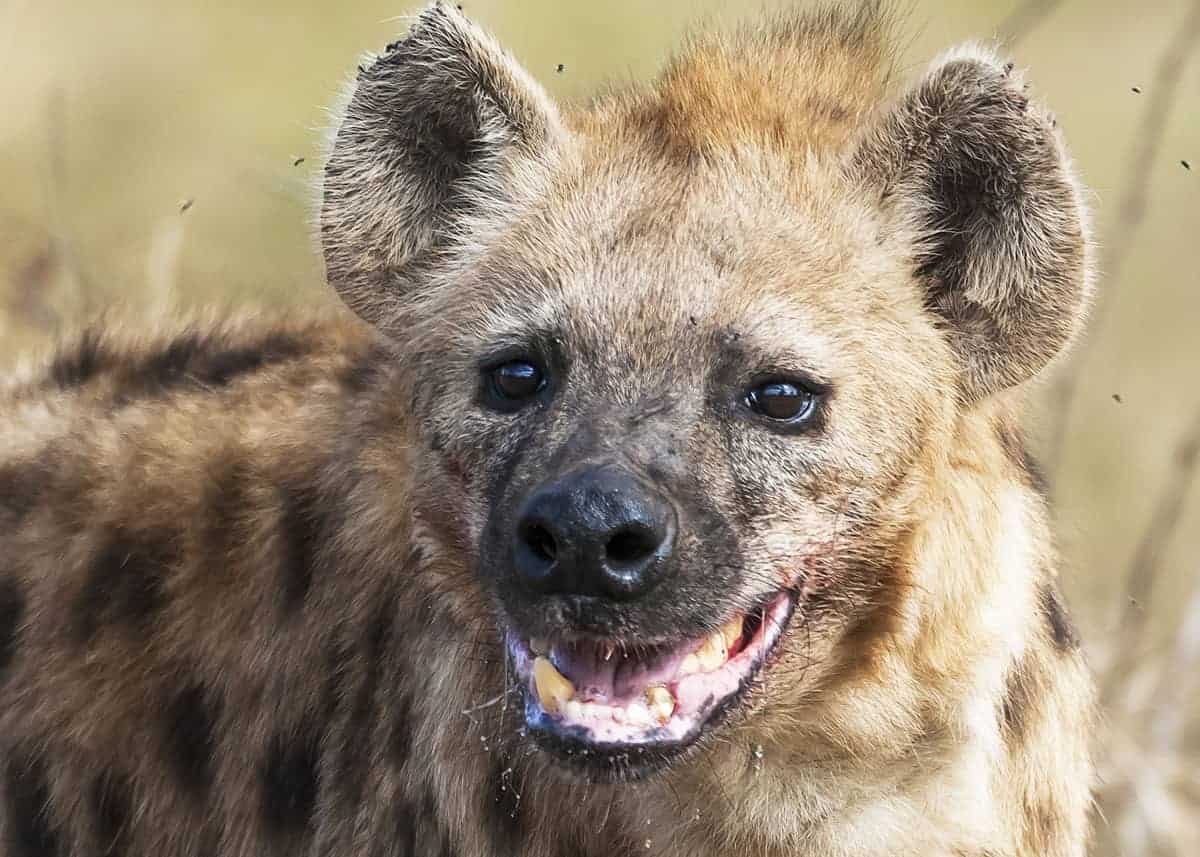
Do Hyenas Really Laugh?
No. Hyenas aren’t actually laughing. While the vocalizations of the spotted hyena might sound like laughing to us, they are anything but a laugh.
For an expression to be considered laughing, the individual should be expressing an emotion like pleasure, amusement, joy, or scorn. And hyenas just aren’t expressing these emotions – at least not consistently – when making their laughing sounds.
Do laughing hyenas really laugh? No. At least not by human standards. The noises that sound like laughter to us are actually a complex set of vocalizations. These sounds are used to communicate with other members of their group and those in rival groups.
Hyenas aren’t expressing joy and pleasure with their “laughing”.
Why do hyenas “laugh”? Spotted hyenas have a complex series of vocalizations that have been described as laughing but are actually how they communicate with other individuals in their group.
What a Hyena Laugh Communicates
Before we get to the specific hyena sounds, here are four things to know.
Hyenas communicate a significant amount of information with each vocalization. This includes warning, submission, and laced into the message also includes their age and rank.
- High-pitched calls: indicate submission, warnings, fear
- Low-pitched calls: indicate aggression, especially when expressed loudly
- Pitch of the call: indicates the age of the individual
- Frequency variation: indicates their social rank in the group
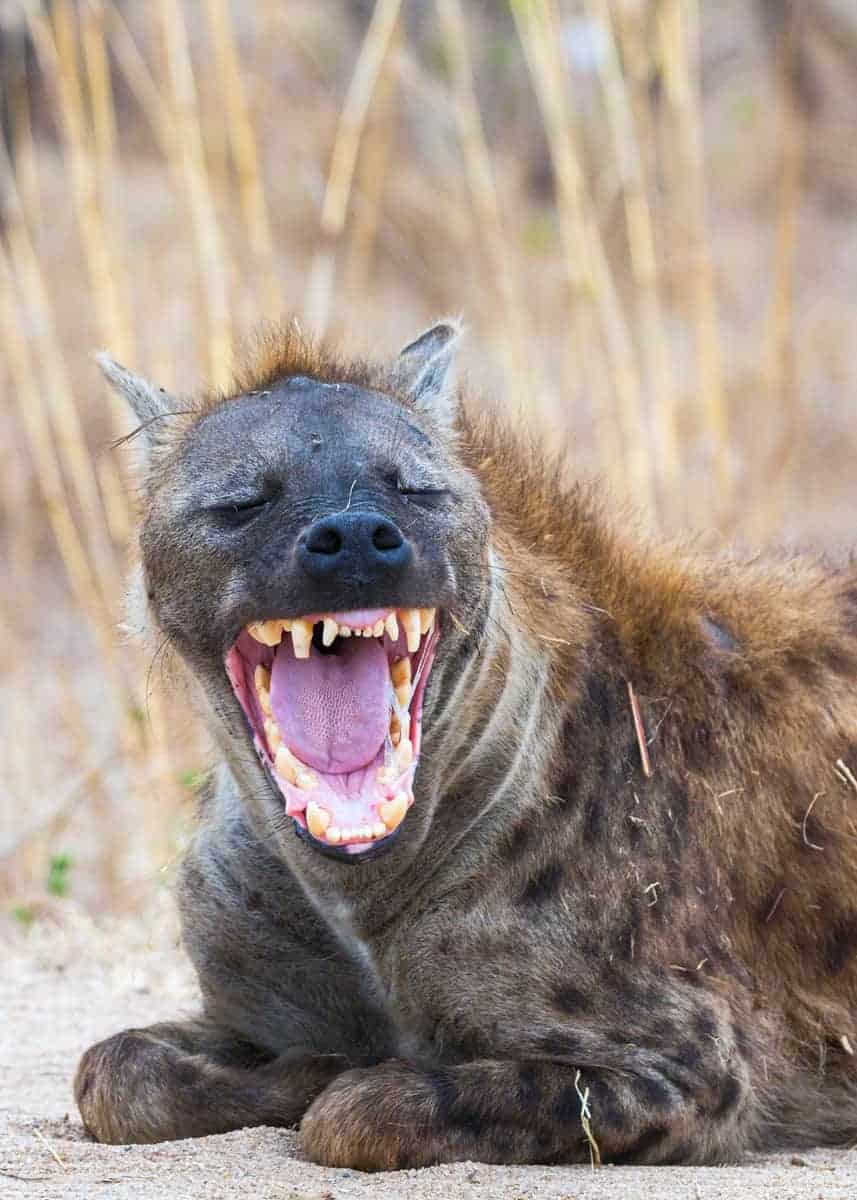
Need help choosing the best camera for your safari? Our guide will help.
Did you know that hyenas are one of the loudest animals on earth?
12 Vocalizations of the Laughing Hyena
What does it mean when hyenas laugh? Hyenas are highly social and use their vocalizations to communicate with each other within their cackle, and with rival groups.
Here’s an explanation of each of their 12 vocalizations.
- Whoop: A series of calls (from 6-15) spread over 30 seconds to more than 2 minutes. Each call lasts 2-3 seconds with 2-10 second intervals. This is easily identified by the “oo” tone. The tone begins low and ends high. Impressively, this sound can be heard more than 3 miles (5 km) away. What the whoop means: While this is the most impressive hyena sound, it doesn’t have a specific meaning and is often done spontaneously without any visible trigger.
- Fast Whoop: Similar to the whoop, this vocalization is higher and has shorter intervals. Unlike the whoop, this vocalization has lots of meaning. What the fast whoop means: Used within the group just before an attack on lions or other hyenas over a kill.
- Grunt: A soft growl that lasts a few seconds. What the grunt means: Sort of a warning to an unwanted hyena guest.
- Groan: Similar to a grunt, but higher pitch, with an “ooo” tone. What the groan means: Used in friendly meetings of the group.
- Low: Similar tone to the groan, but with a lower pitch. What the low vocalization means: Related to the fast whoop, but less likely to attack rival predators.
- Giggle: Maybe the most disconcerting of the hyena sounds, the giggle is a loud, high-pitched “hee-hee-hee”. Each giggle can last up to 5 seconds. What the giggle means: When fleeing an attack, a hyena will giggle.
- Yell: A high-pitched call that can last a few seconds. What the yell means: similar to most mammals, hyenas let out a yell when they are bit by an attacker.
- Growl: This is a rattling sound that lasts a few seconds. This sound has an “aa” and “oh” tone. What the growl means: Just before biting their attacker, hyenas will let out a growl.
- Soft grunt-laugh: A fast series of low-pitched grunts. This series can last several seconds. What the soft grunt-laugh means: Hyena will make this sound while fleeing from humans or lions. Or when attacking prey.
- Loud grunt-laugh: A little louder than the soft grunt-laugh, this can last longer than 5 minutes. What the loud grunt-laugh means: Used in encounters with other hyena groups and lions.
- Whine: A loud, rapid sound with “eeee” tones. What the whine means: Used by hyena cubs regarding food and nursing, as with most mammals.
- Soft squeal: Similar to the whine, but softer and less staccato. What the soft squeal means: Used by adult and cub hyenas after reuniting with a clan member.
The above data was compiled by Dr. Hans Kruuk back in 1972. It’s now available in his book:
The Spotted Hyena: A Study of Predation and Social Behavior
How do the hyena’s laugh affect its prey?
In his book Brehm’s Life of Animals, Alfred Brehm commented: “It is said that feasting Hyaenas engage in violent fights, and there is such a croaking, shrieking and laughing at such times that a superstitious person might really think all the inhabitants of the infernal regions had been let loose.” — Alfred Brehm (1895)
The vocal range, variety, and volume from a cackle of hyenas would keep all but the bravest of carnivores away. Their laugh and other sounds serve to put other animals on notice that they should keep away.
Learn more about the vocalizations of another African animal: What sound does a zebra make?
What does “laughing like a hyena” mean?
The term “laughing like a hyena” means to laugh hysterically or in a loud and foolish way.
After hearing the sounds of the spotted hyena, it isn’t hard to see the connection. Hyenas sound like they are laughing out of control.
The expression is a powerful simile – and paints a very visual mental picture. But because a hyena doesn’t actually laugh, it isn’t completely accurate.
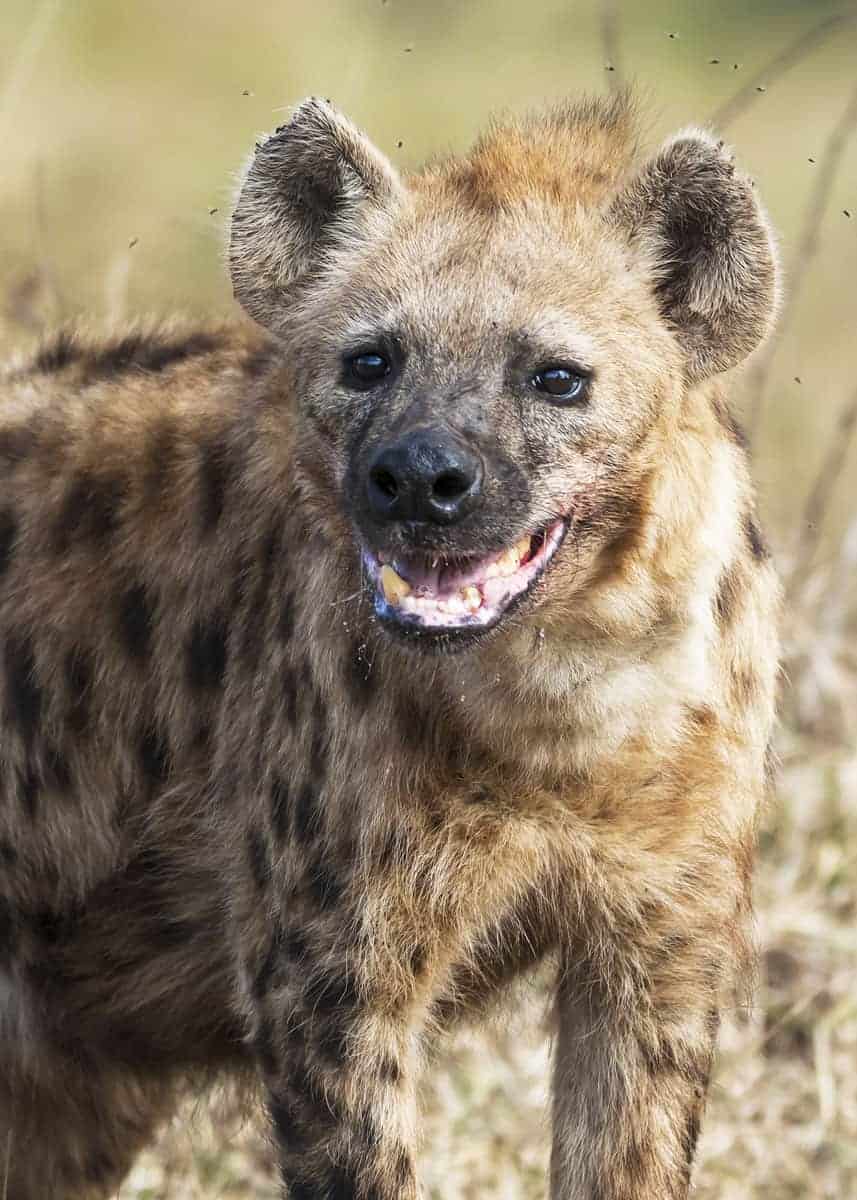
Learn more about other animals you can see in Uganda.
Your turn
Did you learn something in this post? Have a question? Or maybe a point to add? Join me below!


